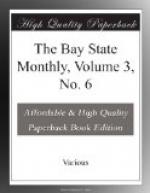But those old Puritans were not men to be bundled by any of the weaknesses of human nature. In ten days, when it was found that nobody had started “westward, ho!” another town-meeting was held, in which, in spite of the dangers to be encountered by the new colony, the first vote was re-affirmed, and it was decided that “the thirtie families be chosen by ye seven men,” probably the selectmen. And to ensure the matter, it was determined that this vote should not be repealed except by the consent of every freeman in the town. So, in the spring, this tiny colony went out to Salisbury new-town.
In 1647, a law was passed requiring every township of fifty families to maintain a school. This is the way that the preamble reads:—
“It being one chiefe pr’ject of yt ould deluder, Satan, to keepe men from ye knowledge of ye Scriptures, as in former times by keeping ym in an unknown tongue, so in these latt’r times by pr’suading from ye use of tongues yt so at least ye true sense & meaning of ye original might be clouded by false glosses of saint-seeming deceivers, yt learning may not be buried in ye grave of o’r fath’rs in ye church & commonwealth, the Lord assisting our endeavor. It is therefore resolved,” &c.
It seems overturning the cornerstone of our forefathers’ intentions to banish from our schools the Scriptures, those finest examples of the strength and beauty of the English language, to say nothing of their lessons in individual self-government, which is the only foundation that a republic can be built upon.
From this old law have grown up all the public schools of Amesbury. There is now a high school, and there are, of course, the required number of small schools; some of these in the outlying districts having very few scholars.
Several years ago Mr. Whittier, who has the keenest sense of humor, told a friend that in one of these the whole number of pupils was three, average attendance one and a half! He was deeply interested in that half child.




